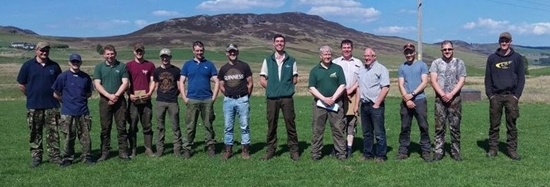 A core GWCT vision is striving to achieve a countryside rich in both game and wildlife. To be successful in this journey, we must work together on all fronts of conservation, from the practitioners on the ground to the policymakers above, guiding the environmental sector in a wise, pragmatic direction.
A core GWCT vision is striving to achieve a countryside rich in both game and wildlife. To be successful in this journey, we must work together on all fronts of conservation, from the practitioners on the ground to the policymakers above, guiding the environmental sector in a wise, pragmatic direction.
The Trust has a long history of scientific research into UK wading bird population dynamics, how they breed and, more importantly, how they can be protected and conserved. We have all seen dramatic declines in many of our upland bird assemblages, most notably our breeding curlew population. There is said to be fewer than 300 pairs of curlew south of Birmingham in England, with a forecast of regional species extinction in less than ten years.
 These novel wader count training courses that GWCT Scotland is rolling out across the country stem from a working partnership encouraged by Working for Waders, a Moorland Forum initiative. The wader counts will involve the farmers, keepers and land managers carrying out the monitoring themselves. The GWCT has championed this approach to ecological monitoring for many years, as we believe the “boots on the ground” are the best people suited to knowing their own local conditions, landscapes and the species that inhabit their own diverse regions. Scottish Government officials are particularly keen for this approach to be undertaken, as local community buy-in for such matters is key to achieving a balanced, sustainable approach to landscape-scale nature conservation.
These novel wader count training courses that GWCT Scotland is rolling out across the country stem from a working partnership encouraged by Working for Waders, a Moorland Forum initiative. The wader counts will involve the farmers, keepers and land managers carrying out the monitoring themselves. The GWCT has championed this approach to ecological monitoring for many years, as we believe the “boots on the ground” are the best people suited to knowing their own local conditions, landscapes and the species that inhabit their own diverse regions. Scottish Government officials are particularly keen for this approach to be undertaken, as local community buy-in for such matters is key to achieving a balanced, sustainable approach to landscape-scale nature conservation.
The counts themselves will be made up of two different types. Firstly, three line transect counts will be undertaken from the first week of April to the first week in June each year, with the third count being no earlier than the third week in May to gauge wader chick fledging success. These line transect counts will aim to count the maximum number of breeding pairs of wading birds.
The second type of counts are known as vantage point watches. These are basically points across a farm/estate that has adequate views of breeding wader hot spots and where one can sit (ideally in a vehicle to minimise disturbance) and use binoculars to count as many wader chicks as possible. This will give us a better understanding on how well species such as lapwing and oystercatcher are breeding in the many different areas we are hoping to cover with this large-scale monitoring scheme.
 As part of our Advisory service across Scotland, we now are offering wader count training days, which incorporate a PowerPoint presentation on all the background material related to this project, identification skills training, and then a brief example of a count. Here the course attendees are taken out to physically walk along a transect line whilst the training provider runs through how to fill in the wader count cards.
As part of our Advisory service across Scotland, we now are offering wader count training days, which incorporate a PowerPoint presentation on all the background material related to this project, identification skills training, and then a brief example of a count. Here the course attendees are taken out to physically walk along a transect line whilst the training provider runs through how to fill in the wader count cards.
The other package that we offer is one-to-one morning wader counts. This involves one of our Advisory team accompanying a farmer, keeper or land manager to physically carry out a complete early morning count. This service has been very popular with a number of individuals as it covers all the necessary elements to the counting methodology whilst also making things clearer on different situations that occur. We had a high turnout for our training days in Aberdeenshire and East Lothian, and one morning count near Kelso produced a fantastic curlew count.

This sort of approach and data will help move our understanding forward on wader conservation, including issues such as farming practices and predator impacts. Undoubtedly future adaptive management options for waders will have other positive knock-on effects for other sensitive species of conservation concern like black grouse, ring ouzel and merlin. The aforementioned birds are but a few species amongst many others that are continuously failing to maintain stable populations. We must adapt and try new approaches to combat these challenges, following the ethos of conservation through wise use and management.
If you are interested in attending a GWCT wader count training course please contact:
T: 01738 551511
E: scottishhq@gwct.org.uk